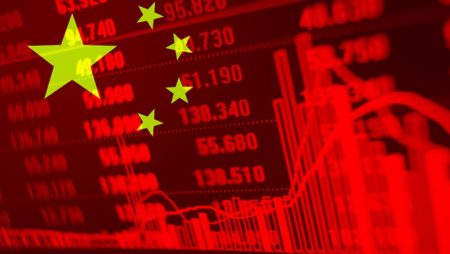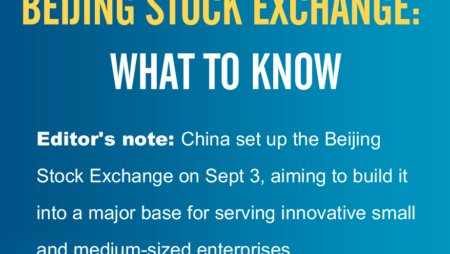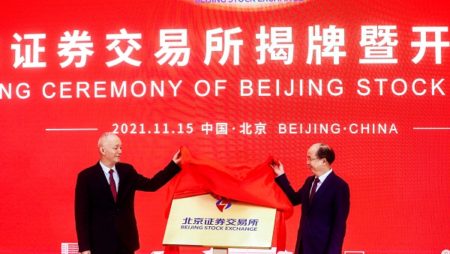Beijing Stock Exchange Opens up Financing Channels for Small Companies

The establishment of the Beijing Stock Exchange has provided a new financing channel for many small and medium-sized Chinese enterprises which may eventually rise in the future to become industry leaders with their pioneering technologies, market experts said.
Of the first batch of 81 companies listed on the BSE, 87 percent are from advanced manufacturing, modern services, high-tech services and strategic emerging industries.
Seventeen of the debutants are “little giants” recognized by the Ministry of Industry and Information Technology. They are leading SMEs that specialize in niche sectors, command a high market share, and boast strong innovative capacity and core technologies.
Hangzhou, Zhejiang province-based wireless communication network service provider Gcom Technology is one of the first companies to trade on the new bourse. Zhao Guomin, the company’s chairman, explained that innovation and core competitiveness are the two basic requirements for listing on the BSE.
“SMEs usually report greater ups and downs in business performance, which is not a fatal defect on the BSE. Sustained business growth, or in other words, the company’s quality, is what the BSE cares for the most,” Zhao said.
Qingdao FengGuang Precision Machinery Co Ltd also started trading on the BSE on Nov 15, the day when the new exchange opened for business. As the company’s chairman, Li Jun understands that the launch of the BSE provides great opportunities for technologically advanced SMEs.
Technology and capital will be more efficiently allocated on the BSE, through which technological “little giants” can reach for key parts of the industrial chain with the help of the capital market and move up the value chain, he said.
The central government has paid more attention to the development of these “little giants” this year. The development of the “little giants “was written into the 14th Five-Year Plan (2021-25) released in March. During the meeting held by the Political Bureau of the Communist Party of China Central Committee on July 30, top leaders stressed for the first time the development of the “little giants”, saying more basic research should be conducted and more efforts should be made in technology innovation.
Xiao Yaqing, minister of industry and information technology, said 95 percent of the 40 million registered companies are SMEs, which have made huge contributions in terms of providing job opportunities and boosting economic growth.
As of Nov 23, there were 4,762 national-level “little giants” recognized by the Ministry of Industry and Information Technology, while the ministry’s goal is to nurture at least 10,000 such small technology pioneers by the end of 2025.
But financing has affected SMEs for a long time. Indirect financing, which is best represented by bank loans, has been prevalent in the Chinese market. It is not easy for SMEs to seek financing under such circumstances as they cannot provide collateral for bank loans.
Therefore, the launch of the BSE has opened the direct financing channel, or equity financing, for SMEs, said Jiang Qijia, senior analyst with financial service provider Noah Holdings Ltd.
On the other hand, the BSE will serve as a competitor to banks. While commercial banks have been tightening loans provided to property developers, they will reconsider distributing some of their credit to qualified SMEs, he added.
While the BSE has been built upon the NEEQ Select, the highest tier of the National Equities Exchange and Quotations, the bourse itself will help extend the reform of the NEEQ.
Established in 2013, the NEEQ has attracted more than 13,000 SMEs and privately owned enterprises to conduct equity trading. But the NEEQ has encountered “growing pains” over time.
Experts from professional services provider EY said NEEQ companies are much smaller compared to companies listed on the sci-tech innovation-focused STAR Market in Shanghai and the startup board ChiNext in Shenzhen, Guangdong province, let alone those listed on the A-share main board.
Meanwhile, the NEEQ companies are at an early development stage and the technologies and products in their pipelines are extremely pioneering. In other words, these companies will bring more risks and uncertainties. They are in urgent need of capital but lower liquidity at the NEEQ points to insufficient capital supply.
A number of measures have been taken since July last year to inject more vitality into the NEEQ. The NEEQ Select tier has been introduced. Qualified NEEQ Select companies can go list on the other A-share boards without undertaking an initial public offering.
The launch of the BSE will deepen NEEQ reform by increasing liquidity on the NEEQ, said Zhu Haibin, chief NEEQ analyst at Essence Securities. This would lead to more attention being directed to the NEEQ, elevating investor interest.
Among the NEEQ Select companies, 48.7 percent are specialized in material development, 25 percent are industrial companies, and 11.3 percent are information technology providers.
With more potential capital flowing into the NEEQ, companies in those industries will promise more room for growth and a number of them will rise into large market-cap companies, said Gu Xinfeng, fund manager at China Asset Management.
Ethan Wang, head of investment strategy for wealth management at Standard Chartered China, said it may be difficult to predict how many companies will be successfully transferred to the other A-share boards but high expectations have been pinned on the BSE, which may nurture more companies like Huawei or leading battery producer CATL, he said.




